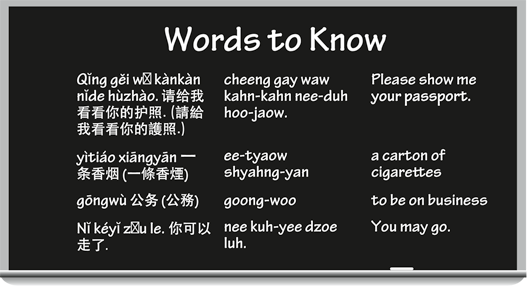Chinese For Dummies (112 page)
Read Chinese For Dummies Online
Authors: Wendy Abraham
Agent:
QÇng gÄi wÇ kà nkà n nÇde hùzhà o.
cheeng gay waw kahn-kahn nee-duh hoo-jaow.
Please show me your passport.
Georgia shows him her passport, and the agent asks her some important questions.
Agent:
MÄiguórén. NÇ yÇu méiyÇu yà o shÄnbà o de wùpÇn?
may-gwaw-run. nee yo mayo yaow shun-baow duh woo-peen?
American. Do you have anything you'd like to declare?
Georgia:
MéiyÇu. WÇ zhÇ yÇu yìtiáo xiÄngyÄn.
mayo. waw jir yo ee-tyaow shyahng-yan.
No. I have only a carton of cigarettes.
Agent:
NÇ lái zhèr shì bà n gÅngwù háishì lÇyóu?
nee lye jar shir bahn goong-woo hi-shir lyew-yo?
Are you here on business or as a tourist?
Georgia:
WÇ lái zuò shÄngyì.
waw lye dzwaw shung-ee.
I've come on business.
Agent:
NÇ kéyÇ zÇu le.
nee kuh-yee dzoe luh.
You may go.

Navigating Around Town
It's Friday night, and you just had a pretty successful day doing business with your Chinese counterparts. You've finally mustered the courage to venture out of your hotel room for a night on the town. You decide to check out a popular dance hall, and you begin to determine what mode of transport can best get you there.
 Renting a car is virtually impossible in China. Cars just aren't available. And even if you can find a rental, you may not want to get one, given the bureaucracy and driving conditions. Signs aren't printed in English, which is probably the main reason you shouldn't even attempt driving. Just think of the upside. You don't have to suddenly learn how to use a stick shift or purchase any extra car insurance. Let someone else worry about how to get you from point A to point B.
Renting a car is virtually impossible in China. Cars just aren't available. And even if you can find a rental, you may not want to get one, given the bureaucracy and driving conditions. Signs aren't printed in English, which is probably the main reason you shouldn't even attempt driving. Just think of the upside. You don't have to suddenly learn how to use a stick shift or purchase any extra car insurance. Let someone else worry about how to get you from point A to point B.
No matter what form of
jiÄotÅng
交é
(jyaow-toong) (
transportation
) you end up taking, here are a few crucial words and phrases to know:
 fÄngxià ng
fÄngxià ng
æ¹å
(fahng-shyahng) (
directions
)
 dìtú
dìtú
å°å¾
(
å°å
) (dee-too) (
map
)
 WÇ mÃlù le.
WÇ mÃlù le.
æè¿·è·¯äº
. (waw mee-loo luh.) (
I'm lost.
)
Hailing a cab
Although
zìxÃngchÄ
èªè¡è½¦
(
èªè¡è»
) (dzuh-sheeng-chuh) (
bicycles
),
mótuÅchÄ
æ©æ车
(
æ©æè»
) (maw-twaw-chuh) (
motorcycles
),
mÇchÄ
马车
(
馬è»
) (mah-chuh) (
horse-drawn carts
), and even
niú
ç
(nyo) (
cows
) are still the main forms of transportation for the average individual in some parts of mainland China, most foreigners take taxis wherever they go. You can easily find taxis around hotels, and cabs are certainly more comfortable and convenient than having to deal with nonexistent rules of the road; breathing in air pollution while bicycling; finding your way through a maze of old alleyways; or, depending on the time of year, leaving yourself to the mercy of the natural elements.
Here's what you say to the hotel door attendant if you want help hailing a cab:
WÇ yà o jià o jìchéngchÄ.
æè¦å«è®¡ç¨è½¦
. (
æè¦å«è¨ç¨è»
.) (waw yaow jyaow jee-chung-chuh.) (
I'd like a taxi.
)
After you're safely ensconced in the cab, you need to know how to say the following phrases:
 NÇ kéyÇ dÄng jÇ fÄn zhÅng ma?
NÇ kéyÇ dÄng jÇ fÄn zhÅng ma?
ä½ å¯ä»¥çå åéå
? (
ä½ å¯ä»¥çå¹¾åéå
?) (nee kuh-yee duhng jee fun joong mah?) (
Can you wait a few minutes?
)
 QÇng dÇ biÇo.
QÇng dÇ biÇo.
请æ表
. (
è«æ表
.) (cheeng dah byaow.) (
Please turn on the meter.
)
 QÇng dà i wÇ dà o zhèige dìzhÇ.
QÇng dà i wÇ dà o zhèige dìzhÇ.
请带æå°è¿ä¸ªå°å
. (
è«å¸¶æå°éåå°å
.) (cheeng dye waw daow jay-guh dee-jir.) (
Please take me to this address.
)
 QÇng kÄi kuà i yìdiÇr.
QÇng kÄi kuà i yìdiÇr.
请å¼å¿«ä¸ç¹å¿
. (
è«éå¿«ä¸é»å
.) (cheeng kye kwye ee-dyar.) (
Please drive a little faster.
)
 QÇng kÄi mà n yìdiÇr.
QÇng kÄi mà n yìdiÇr.
请å¼æ
¢ä¸ç¹å¿
. (
è«éæ
¢ä¸é»å
.) (cheeng kye mahn ee-dyar.) (
Please drive a little slower.
)